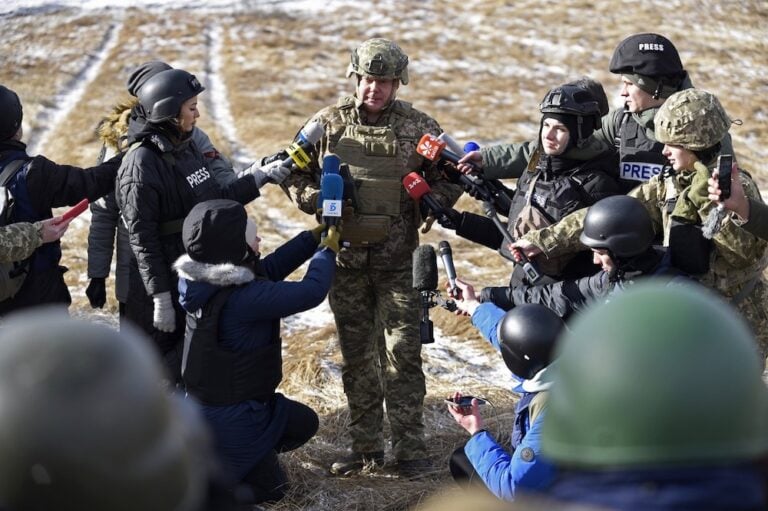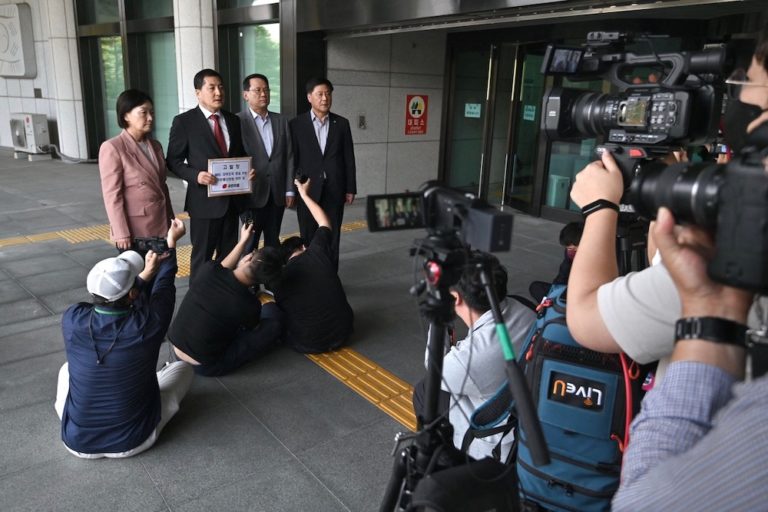(IPI/IFEX) – The following is a 1 July 2001 IPI press release: Vienna, 1 July 2001 IPI Appeals to the South Korean Judicial and Governmental Authorities to Proceed With Caution in Prosecutions for Tax Evasion In the following statement of concern, IPI sets out its belief that the government and judiciary of South Korea should […]
(IPI/IFEX) – The following is a 1 July 2001 IPI press release:
Vienna, 1 July 2001
IPI Appeals to the South Korean Judicial and Governmental Authorities to Proceed With Caution in Prosecutions for Tax Evasion
In the following statement of concern, IPI sets out its belief that the government and judiciary of South Korea should act cautiously when deciding to bring prosecutions for tax evasion.
The International Press Institute (IPI), the global network of editors and media executives, is deeply concerned about the recent charges of tax evasion initiated against several Korean media outlets and individuals from a number of these outlets.
According to IPI’s sources, on 29 June, the National Tax Service (NTS) submitted its report to the prosecutors, who will now conduct their own investigation into this matter. It is believed that six newspaper companies, their CEOs, and five individuals in their personal capacity may face criminal charges for tax evasion. A number of individuals could face charges both in their personal capacity and as CEOs of the media outlets. In addition, other individuals, such as former CEOs of the media outlets, will be prosecuted. The charges are based on a four-month tax probe that resulted in fines of US$ 390 million against 23 Korean media firms. The newspapers that have been charged are: Chosun Ilbo, Dong-A Ilbo, Hankook Ilbo, JoongAng Ilbo, Kookmin Ilbo, and Daehan Maeil. Chosun Ilbo president Bang Sang-hoon, Chosun Ilbo executive manager Bang Kye-Sung, Dong-A Ilbo honorary chairman Kim Byung-kwan, Dong-A Ilbo vice-president Kim Byung-Keon, and Kookmin’s Next Media Holdings chairman Cho Hee-Jun have been charged on a personal basis.
Although IPI does not have the relevant information concerning the results of the tax probe before it, IPI believes that this probe was, in part, politically motivated. Moreover, while IPI wishes to stress the fact that newspapers are by no means to be regarded as being above the law, including immunity from tax investigations, it is the considered opinion of IPI that certain aspects of the investigation were instituted with the intention of intimidating the media and achieving the much disputed Korean press reform by criminalising both the media owners and the media enterprises. These fears are substantiated when viewed in the light of other measures undertaken by the authorities against major media owners.
The procedure reminds IPI of the tax inspection case of Hong Suk-hyun, then president and publisher of the JoongAng Ilbo, who was arrested on 22 October 1999, and held in detention for several weeks until his trial. Given the fact that Hong resigned as president and publisher of JoongAng Ilbo on 26 October 1999, if there was any political motivation behind the legal procedure, the campaign certainly achieved its goals.
Imprisonment before being found guilty by a judicial body is tantamount to character assassination, particularly in Asian societies. IPI therefore appeals to the Korean prosecution and public authorities to ensure that there is no repetition of such procedures, as applied in the above-mentioned case. Arrest warrants should only be issued when there are serious legal issues at stake, such as the danger of destroying or suppressing evidence, the danger of conspiracy or of fleeing the country.
In the present proceedings, taking into consideration the fact that the NTS inspection lasted 60 days and in some cases even 90 days or more with half of all available NTS tax investigators, IPI believes that all relevant material forming the basis of any legal charges has been available to the investigative authorities for a considerable period of time. Therefore, the danger of suppressing or destroying relevant evidence in this case is minimal.
This also holds true for the danger of engaging in a conspiracy with others who might be implicated in the tax evasion. Moreover, the good character and reputation of the publishers and managers concerned must also be taken into account when deciding whether arrest warrants should be issued. In the opinion of IPI, other means could be employed to ensure that the accused persons stand trial.
It is a fundamental legal principle that a person is innocent until proven guilty. In this specific case, which has raised so much controversy both in Korea and among the international community, the prosecution would have to prove the guilt of those charged by placing overwhelming evidence before the court.
IPI wishes to stress the fact that the above statement should not be seen as interference in Korean judicial proceedings. However, as a press freedom organisation, we would like to remind the Korean authorities that there is a real need to proceed cautiously in this matter, as it may otherwise have a detrimental effect on international confidence in South Korea and unnecessarily stimulate internal conflict.
In addition, considering the sensitive nature of this matter, IPI Director Johann P. Fritz appeals to Korean President Kim Dae-Jung, the Nobel Laureate, to take all the appropriate and necessary steps to ensure that these proceedings are carried out in a transparent and impartial manner. Otherwise questions will always remain with regard to the political motivation of this campaign.


